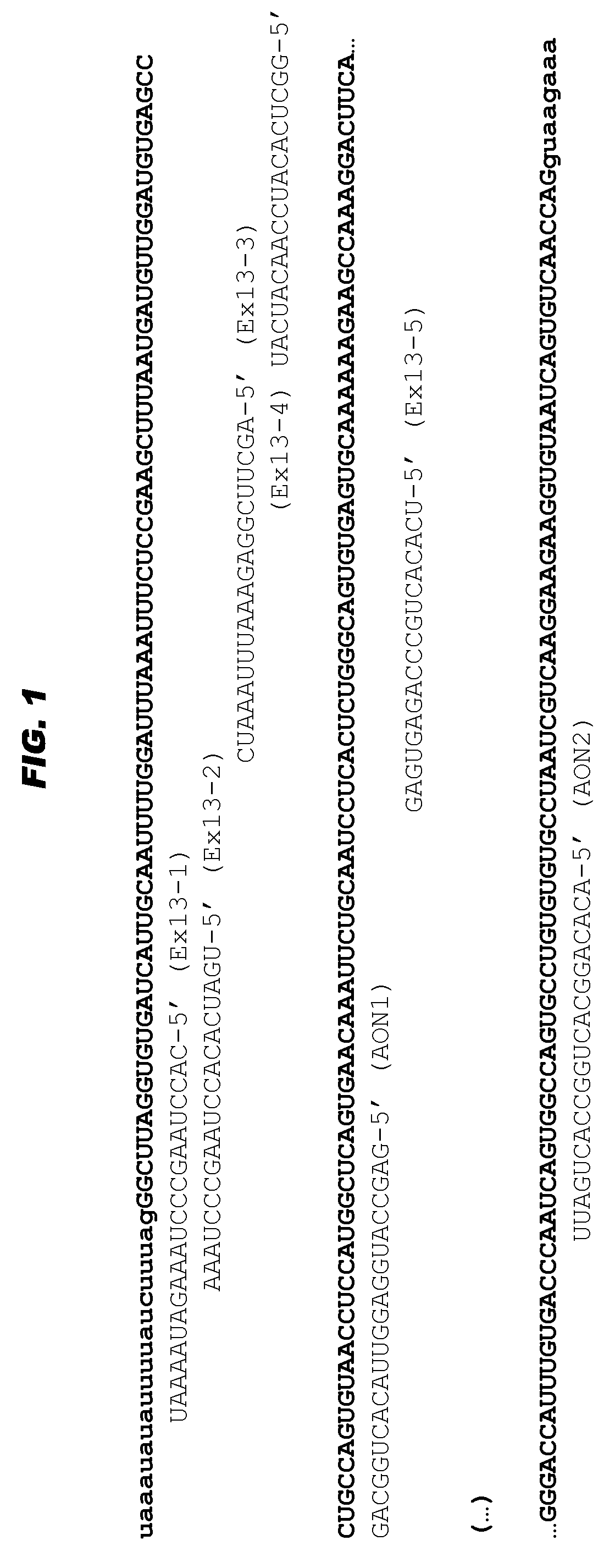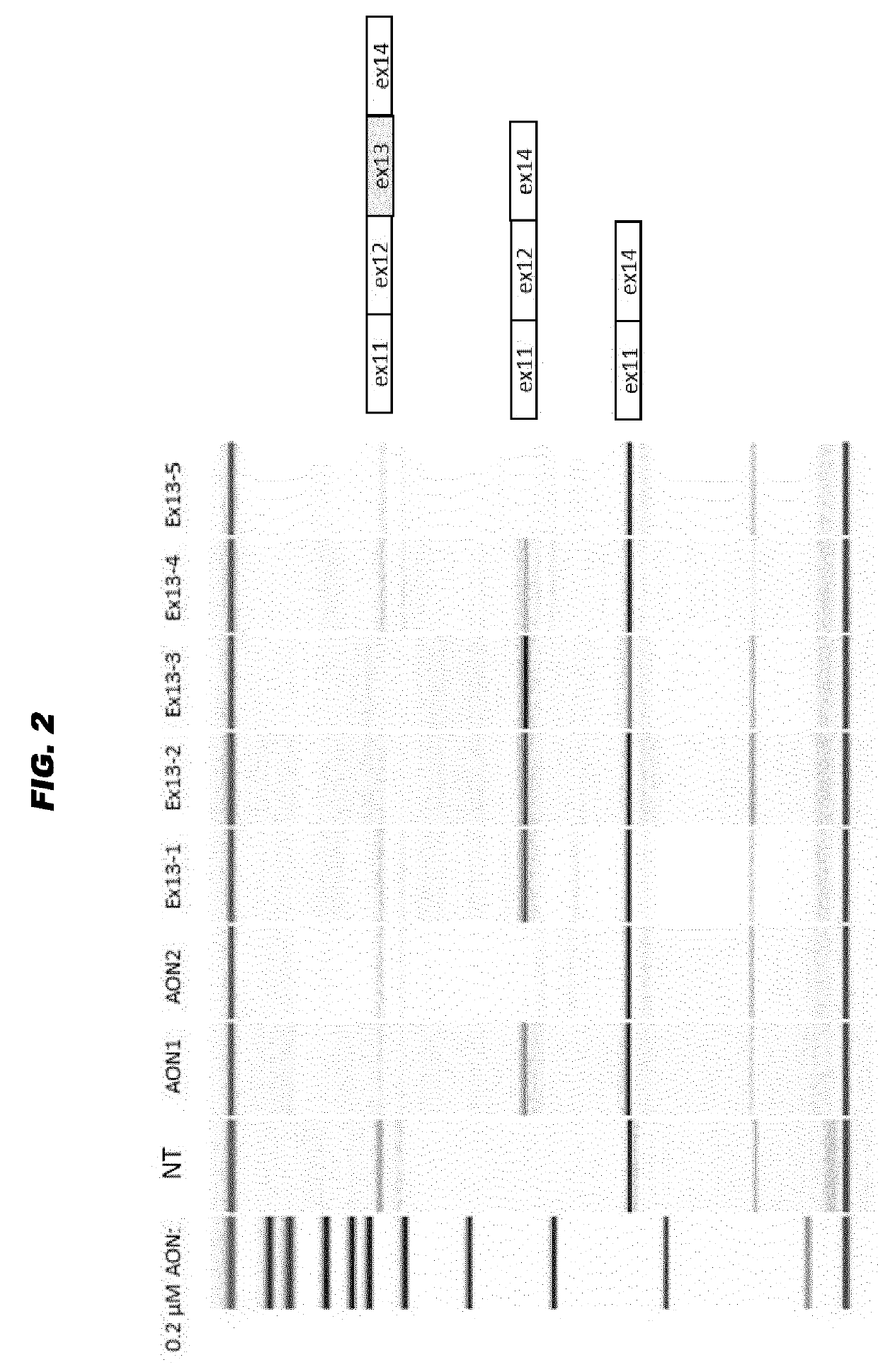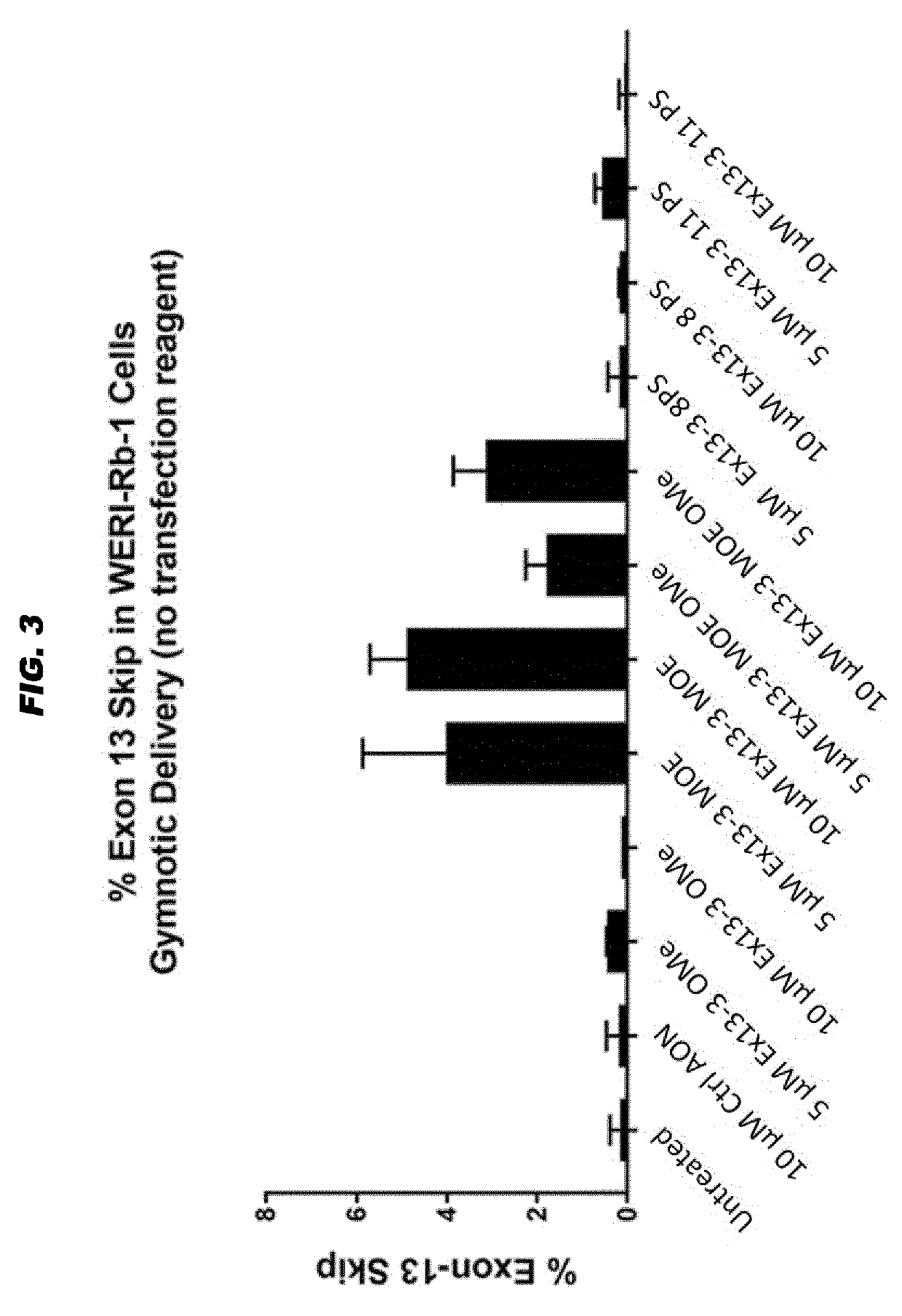Antisense oligonucleotides for the treatment of eye disease
an antisense oligonucleotide and eye disease technology, applied in the field of medicine and immunology, can solve the problems of limiting affecting the effect of a single-stranded antisense oligonucleotide, and affecting the effect of a single-stranded antisense oligonucleotide, and achieves the effect of reducing
- Summary
- Abstract
- Description
- Claims
- Application Information
AI Technical Summary
Benefits of technology
Problems solved by technology
Method used
Image
Examples
example 1
and Testing Alternative Antisense Oligonucleotides (AONs) for Efficient Skipping of Exon 13 in Human USH2A Pre-mRNA
[0069]The sequence of exon 13 of the human USH2A gene was further analyzed for the presence of exonic splice enhancer motifs. Multiple sites were initially determined (see FIG. 1) and subsequently five RNA AONs (Ex13-1 to Ex13-5) were purchased from IDT, and designed with a Tm of 58° C. Initially all AONs were modified with a 2′-O-methyl group at the sugar chain and all had a full phosphorothioated backbone. AONs were kept dissolved in phosphate buffered saline.
[0070]Culture conditions, transfection, RT-PCR and analysis protocols were as described in WO 2016 / 005514, and using general methods known to the person skilled in the art. Human retinoblastoma cells (Weri-Rb1) were cultured in RPMI1640 medium (Gibco) containing 10% (v / v) fetal calf serum (Sigma), 1% 10 U / μl penicillin, 10 μg / μl streptomycin (Gibco) and 1% GlutaMAX (Gibco), at a density of 0.5×106 cells / ml. Cells...
example 2
kipping in Weri-Rb1 Cells Using AONs with Different Chemical Modifications
[0073]Culture conditions, transfection, RT-PCR and analysis protocols were as described in WO 2016 / 005514 and as in example 1 above. 1.0×106 Weri-Rb1 cells were seeded in each well of a 6-wells plate prior to incubation. Cells were incubated gymnotically (hence, without transfection reagents) with a synthetic and isolated oligonucleotide with the Ex13-3 sequence (SEQ ID NO: 7) but carrying 5 different kinds of chemical modification patterns (purchased from LGD Biosearch):
Ex13-3 2′OMe (or Ex13-3 OMe)=2′-O-methyl modification in all sugar entities indicated by ‘m’ (lower case) and full phosporothioated backbone indicated by an asterisk (*):
5′-mA*mG*mC*mU*mU*mC*mG*mG*mA*mG*mA*mA*mA*mU*mU*mU*mA*mA*mA*mU*mC-3′
Ex13-3 2′MOE (or Ex13-3 MOE)=2′-O-methoxyethyl modification in all sugar entities indicated by ‘M’ (upper case) and full phosphorothioated backbone indicated by an asterisk (*); all 2′-O-methoxyethyl modified ...
example 3
ce Exon 13 Skipping in Optic Cups Generated from USH2A Patient Fibroblasts
[0076]Fibroblasts from an USH2 patient carrying both USH2A c.7595-2144A>G (p.Lys2532Thrfs*56) and c.2299delG (p.Glu767Serfs) mutations in compound heterozygosity and fibroblasts from a healthy donor were used for optic cup generation. Fibroblasts from these individuals were reprogrammed using four lentiviruses expressing Oct3 / 4, Sox2, Klf4 and c-Myc by the Radboud UMC Stem Cell Technology Centre (Okita et al. 2011. A more efficient method to generate integration-free human iPS cells. Nat Methods 8:409-412). In brief, induced pluripotent stem cell (iPSC) lines were generated on feeder cells (mouse embryonic fibroblasts), and subsequently maintained in Essential 8 medium (Life Technologies; cat# A1517001). Three clones were cryopreserved at passage ˜6 and further analysed for expression of the pluripotent stem cell markers: SSEA-4, NANOG, TRA1-81 and OCT3 / 4 by immunocytochemistry. In addition, qPCR analysis was ...
PUM
 Login to View More
Login to View More Abstract
Description
Claims
Application Information
 Login to View More
Login to View More - R&D
- Intellectual Property
- Life Sciences
- Materials
- Tech Scout
- Unparalleled Data Quality
- Higher Quality Content
- 60% Fewer Hallucinations
Browse by: Latest US Patents, China's latest patents, Technical Efficacy Thesaurus, Application Domain, Technology Topic, Popular Technical Reports.
© 2025 PatSnap. All rights reserved.Legal|Privacy policy|Modern Slavery Act Transparency Statement|Sitemap|About US| Contact US: help@patsnap.com



